At a Filipino-Cuban Nochebuena celebration, cultures blend — but karaoke is a must

[ad_1]
At a Nochebuena celebration hosted by Filipino American Archie Cubarrubia and his Cuban partner, T.J. Morales, in their North Hollywood home, karaoke is a must for everyone. That includes an 89-year-old Cuban immigrant who had never performed such an act in his life.
Frank Navarro, who came from Miami to visit his 45-year-old daughter, did not know what to do as the melody of Edith Piaf’s “La Vie en Rose” played over the television. When Cubarrubia, 44, handed Navarro a glowing microphone, Navarro put his arms down and shushed the room.
“You have to sing. This is karaoke,” Marie, Cubarrubia and Morales’ friend, told her father as the melody to his favorite song played. Frank simply grinned and covered his forehead.
But after Marie started singing, Frank and his 74-year-old Cuban wife, Maria, were off and running. They laughed and belted out the song as they embraced each other underneath the picture frame of a mascot of Jollibee, a fast-food chain beloved by Filipino Americans.
The whole room of about a dozen people joined in to sing along.
“This is amazing to me,” Frank said after his performance.
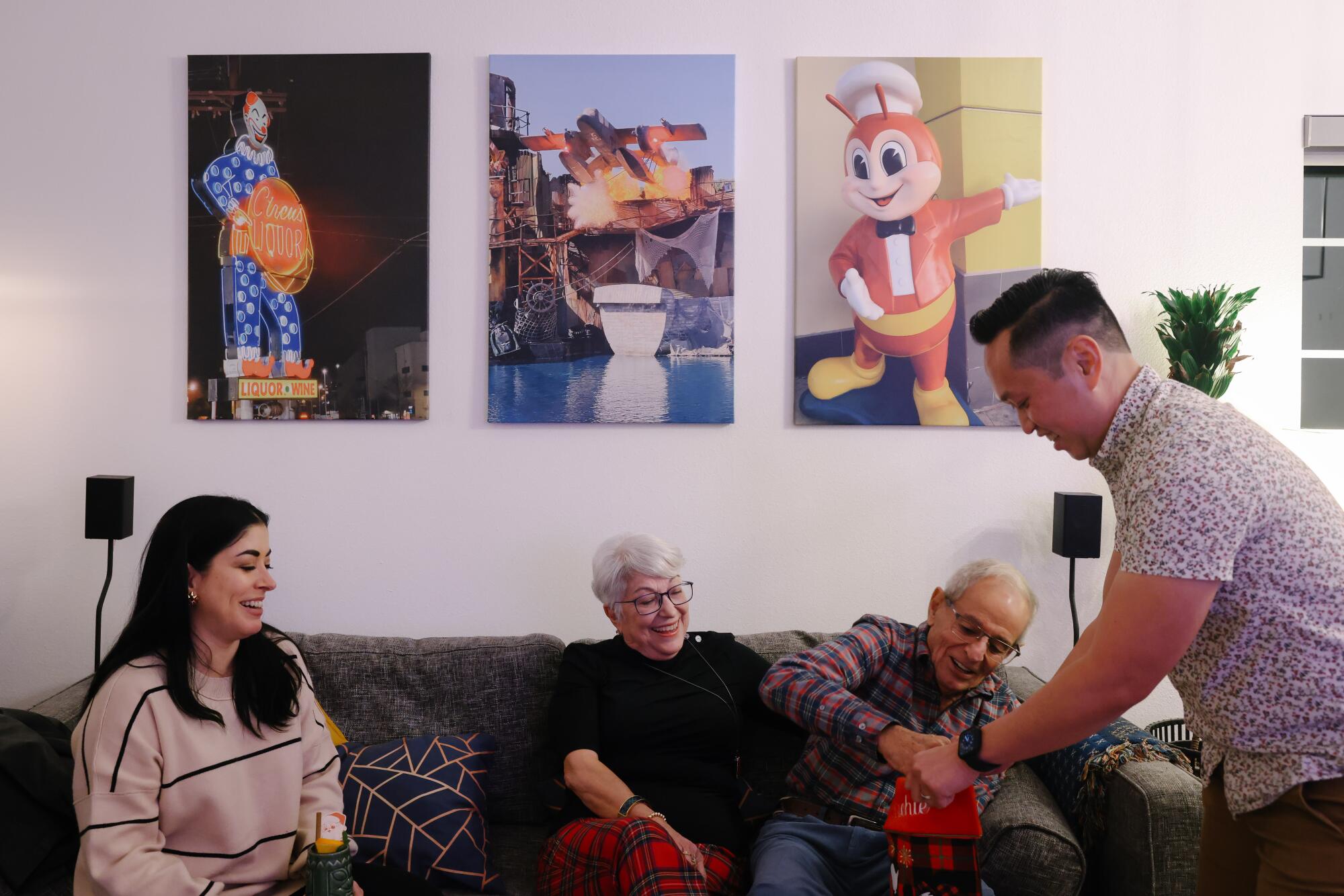
Marie, left, Maria and Frank Navarro pull numbers for a white elephant gift exchange from Archie Cubarrubia, right, during a Nochebuena celebration.
(Dania Maxwell / Los Angeles Times)
Because of the centuries of Spanish colonization, which brought Catholicism to the Philippines, Filipinos share many cultural customs with Latinos. Nochebuena is no exception. In both communities, families and friends bond over a shared meal, exchanging gifts and playing games. Filipinos and Cubans, specifically, also share the tradition of eating lechón, or roast pork, on Christmas Eve.
There are some differences — Karaoke is much more prominent in Filipino Nochebuena, for instance. Cubarrubia and Morales’ celebration featured a wide array of dishes, such as Filipino sour and savory soup of sinigang as well as Cuban picadillo and ham croquettes.
Still, for a Filipino-Cuban couple such as Cubarrubia, a deputy director at the Bill & Melinda Gates Foundation, and Morales, a 39-year-old who handles corporate partnerships at Live Nation, Nochebuena is another reminder of how close both communities are, even as their roots are far apart geographically.
“Whenever we go to each other’s families, it is actually just like being part of our own home cultures,” said Cubarrubia, who met Morales through Match.com in 2008. They have been married and have celebrated Nochebuena together for 10 years.
1
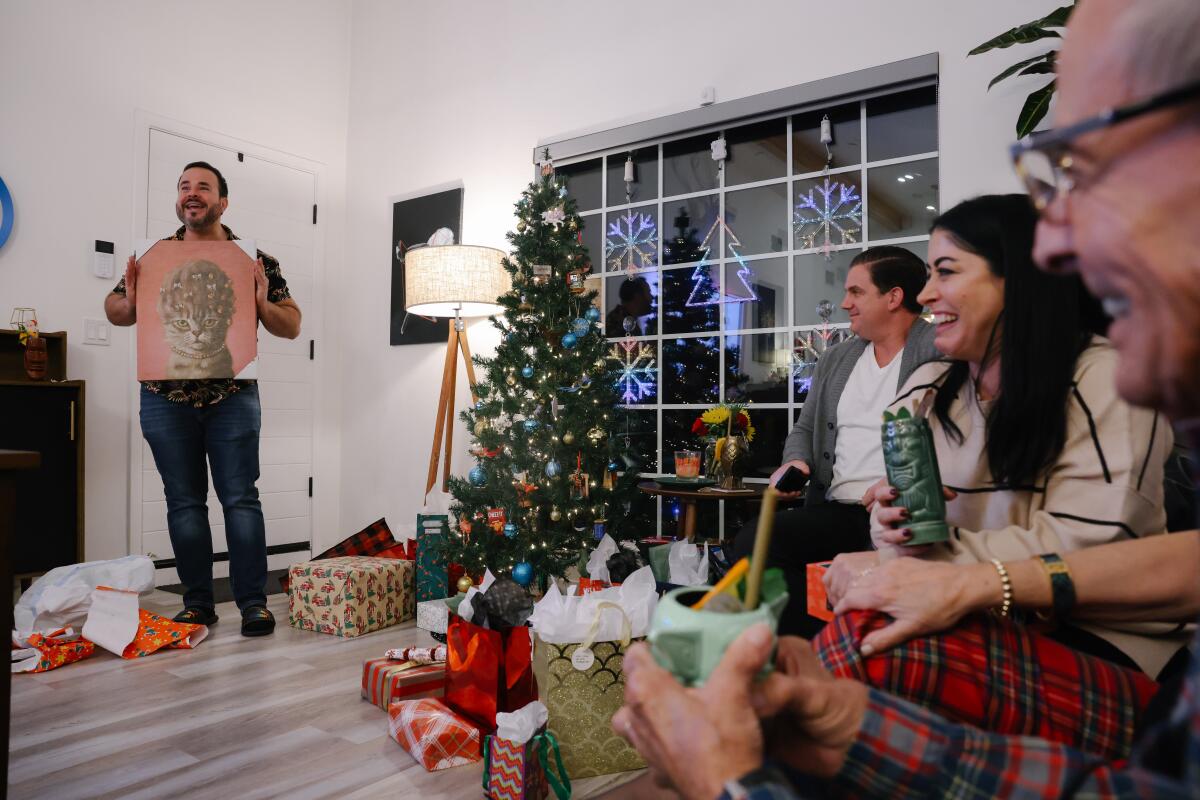
2
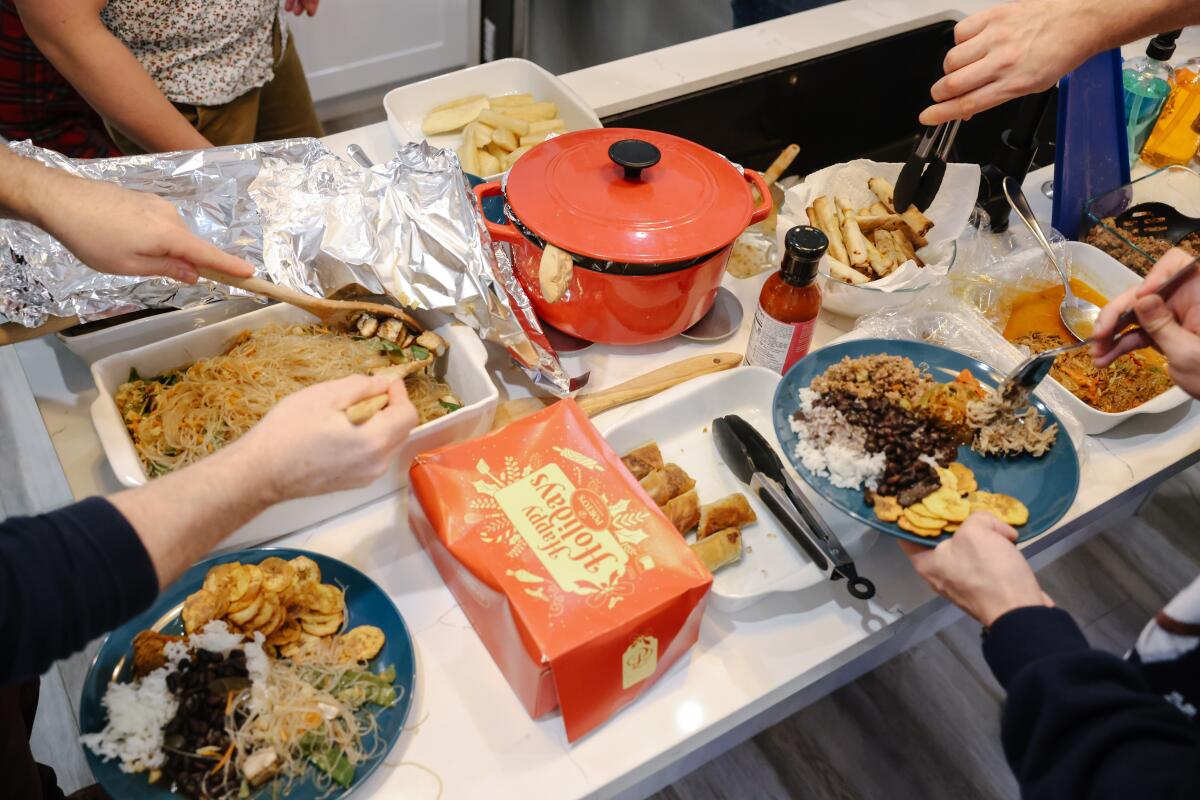
3
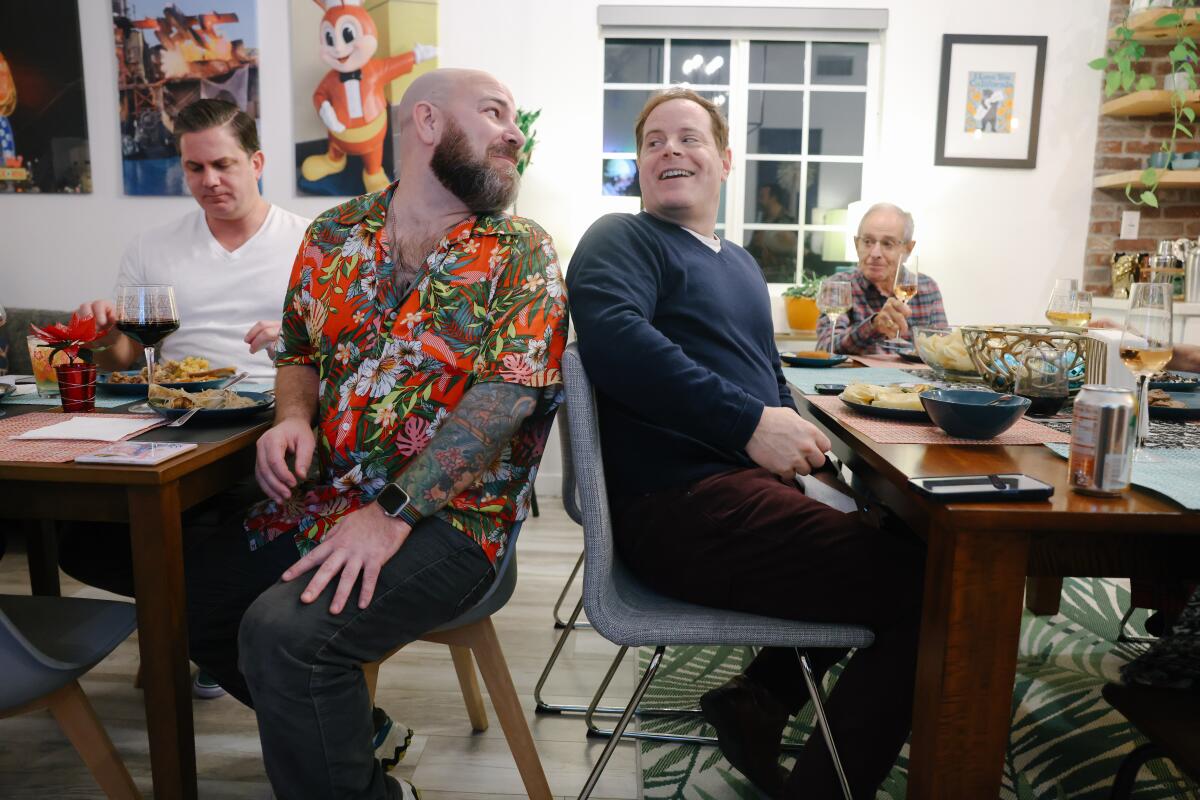
4
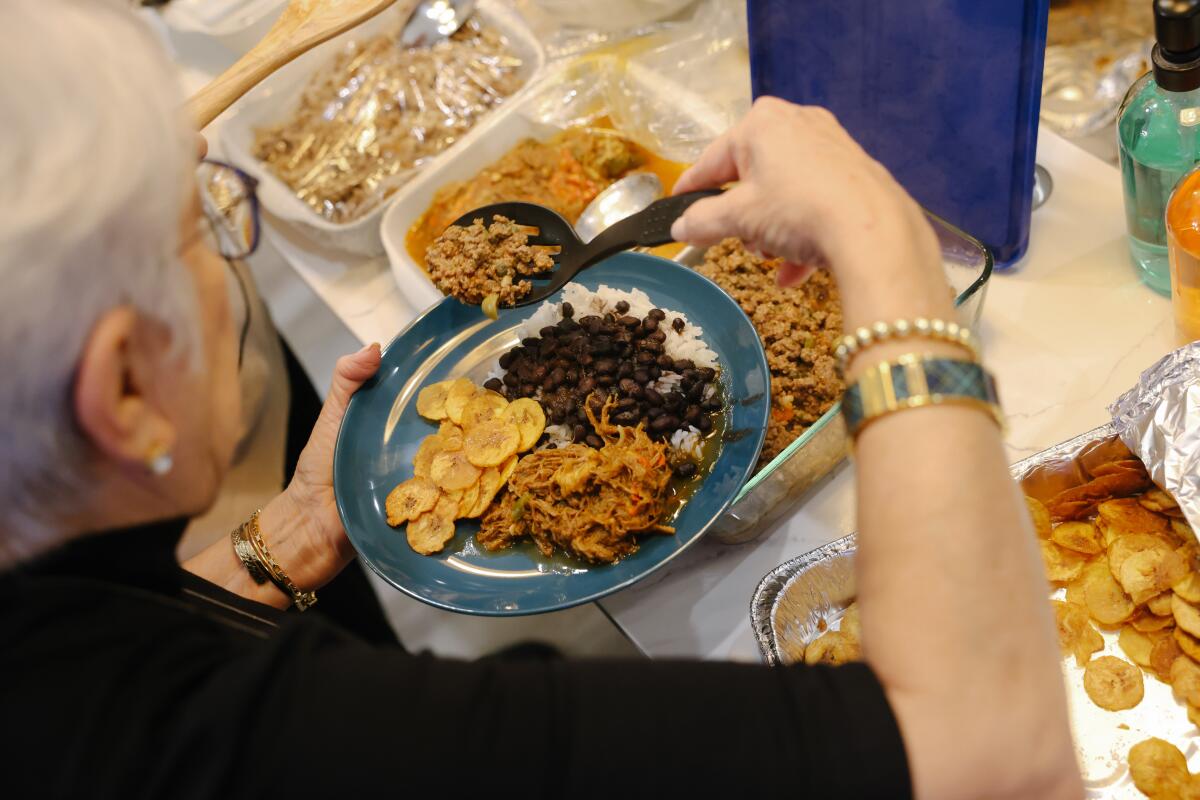
1. North Hollywood, – December 24: T.J. Morales unveils his white elephant gift during a Nochebuena celebration at he and his husband’s home. Nochebuena is celebrated across Filipinos and Latinos alike. 2. A crowd of friends serve their dinners during a Nochebuena celebration on Christmas Eve at their friend’s home. 3. Damian White, left, and Todd Sokolove, right, chat during a Nochebuena celebration. 4. Maria Navarro serves her dinner during a Nochebuena celebration on Christmas Eve at her daughter’s friend’s home. (Dania Maxwell/Los Angeles Times)
Anthony Christian Ocampo, a sociologist who grew up in Northeast L.A., saw firsthand the cultural similarities between Filipinos and Latinos, such as having large multigenerational families and strong connections to their ancestral homelands.
“By no means do I want to romanticize colonialism in any way, shape or form, but the truth is the shared history of Spanish colonialism has played a major role in why Filipinos and Latinos feel connected,” Ocampo said.
In interviewing Filipino Americans for his book exploring these similarities, “The Latinos of Asia,” he learned that many were often mistaken for Latinos in their schools, workplaces, and on the street. Latino immigrants would often speak Spanish to them, he said.
“Many of us are Catholic, we have the same last names, there are many words in Tagalog that are similar to ones in Spanish,” Ocampo said. Basura, for instance, means garbage in Tagalog and Spanish. “This is the influence of Spanish colonialism, and this is what bonds us with Latinos and their culture, even if we are technically not checking the same box on a form.”
In that context, it’s no surprise both communities celebrate Nochebuena, even if the origin of why they celebrate Christmas Eve much more than Christmas is somewhat unknown, said Kevin Nadal, the president of the Filipino American National Historical Society.
Nadal has called on people to think critically about Nochebuena, given its origin from the Spanish colonization. Still, he understands why the celebration matters to the Filipino diaspora.
“It’s an opportunity for people to share their love and to share their gifts and to be kind, which is very much aligned with Filipino culture,” he said. “It just becomes this huge celebration of love.
Eric Medina, 51, grew up celebrating Nochebuena with his Filipino family. Married to a Salvadoran American woman, he now celebrates it with her side of the family with pupusas or panes con pavo (turkey sandwiches). He always makes sure to bring a Filipino dish. It’s often biko, which is sticky rice cake with coconut milk and brown sugar.
The couple spends Christmas Day with his side of the family, watching the Lakers and eating traditional Filipino dishes like pancit, a stir fry noodle dish, and crispy spring rolls known as lumpia. There’s also Jollibee fried chicken.
“It’s kind of hard to explain. I felt really comfortable amongst Latinos. By happenstance, I ended up marrying a Latina,” said Medina, who met his wife at a nonprofit where they both worked.
For Filipino-Latino couples, Nochebuena is also an opportunity for them to learn more about each other’s cultures.
Nico Blitz, a 30-year-old Filipino DJ and producer, and Jackie Ramirez, a 25-year-old Mexican radio host for Real 92.3, have spent Nochebuena together for four years, alternating each year between Blitz’s family in the San Francisco Bay Area and Ramirez’s in East Los Angeles.
At Blitz’s family’s Nochebuena, Ramirez learned how to karaoke, singing a 2000s R&B song with what she called a bit of “liquid courage” — Hennessy, the cognac of choice for many Filipinos.
At Ramirez’s family’s Nochebuena, Blitz learned how to play Loteria, a Mexican take on Bingo. He also tried pozole for the first time.
“When I had pozole for the first time, I said, ‘Oh my god, where have I been my entire life,’ ” said Blitz, who lives in North Hollywood and hosts “Mexipino Podcast” with Ramirez. “I got three servings to myself, and they said, ‘Keep going if you want.’”
There were some awkward moments — Ramirez’s uncle would randomly bring up Filipino comedian Jo Koy and Blitz’s father would talk about the Aztec calendar — but once the two families got to know each other, they realized they share a lot in common. Both families have big gatherings on Christmas Eve, where dozens come together, often in pajamas, to exchange gifts and play games.
“It honestly just feels like a copy and paste,” Blitz said of the two celebrations.
Back at Cubarrubia and Morales’ house, with his right hand on Cubarrubia’s right shoulder, Morales gives a toast with a glass of Kylie Minogue-branded wine.
The crowd cheers as Christian Pino, a 30-year-old medical resident who was born in Cuba and moved to L.A. just six months ago from Philadelphia, perfectly flips a flan out of a pot and onto a plate.
“That’s the real flan!” Marie Navarro tells her dad as she sniffs the dish.
Damian White, a 44-year-old friend of Morales’, serves tiki glasses with Don Papa rum from the Philippines and Bacardi Gold.
“Bacardi is a Cuban company,” Pino tells the room. “Don’t forget.”
And when the karaoke rolls around, Cubarrubia and Morales break out dancing as they sing Olivia Newton-John’s “Xanadu.” Marie follows along, sashaying in front of a Christmas tree as her parents look on.
“We got the karaoke,” Cubarrubia says. “But the dancing part, the Cuban Americans have down pat.”
[ad_2]